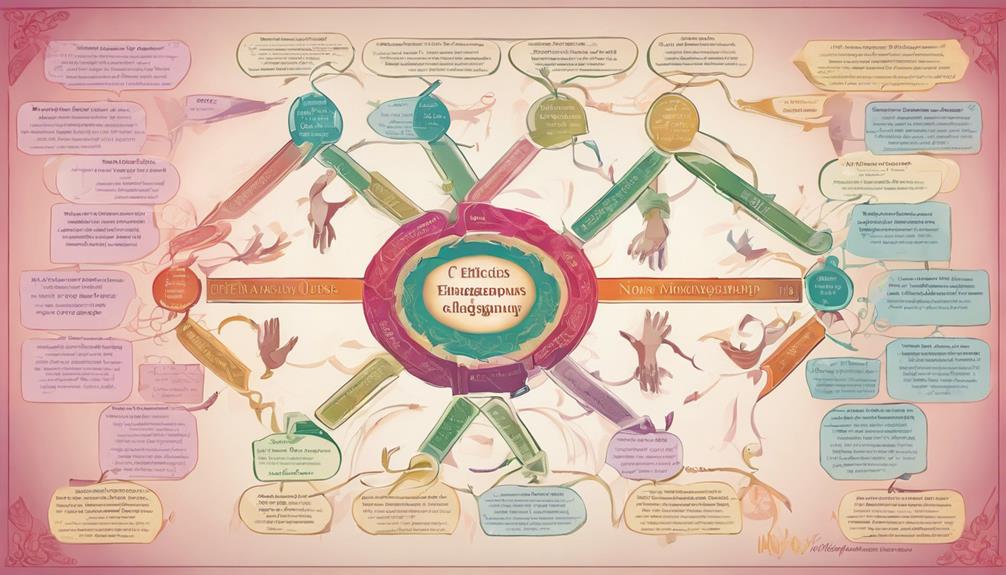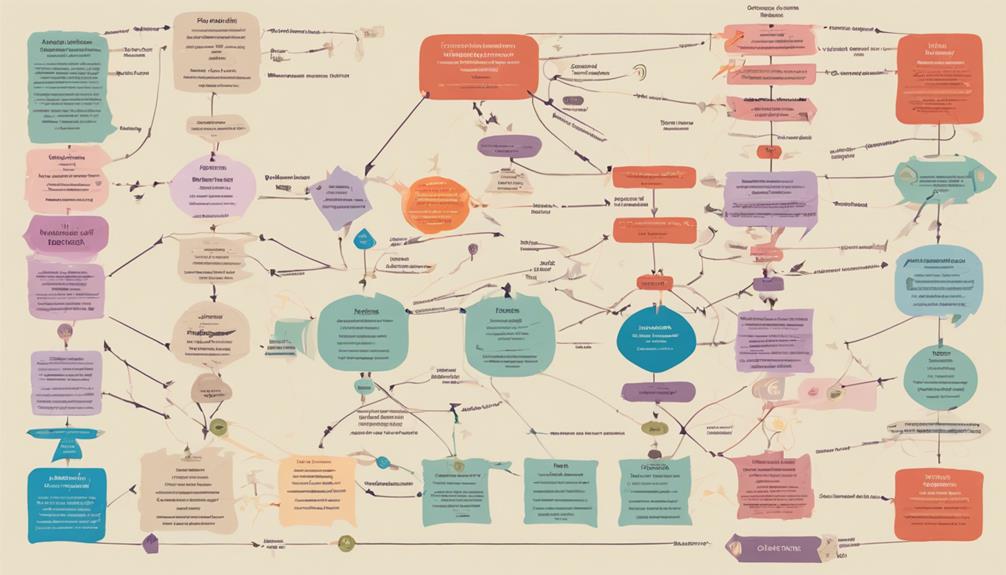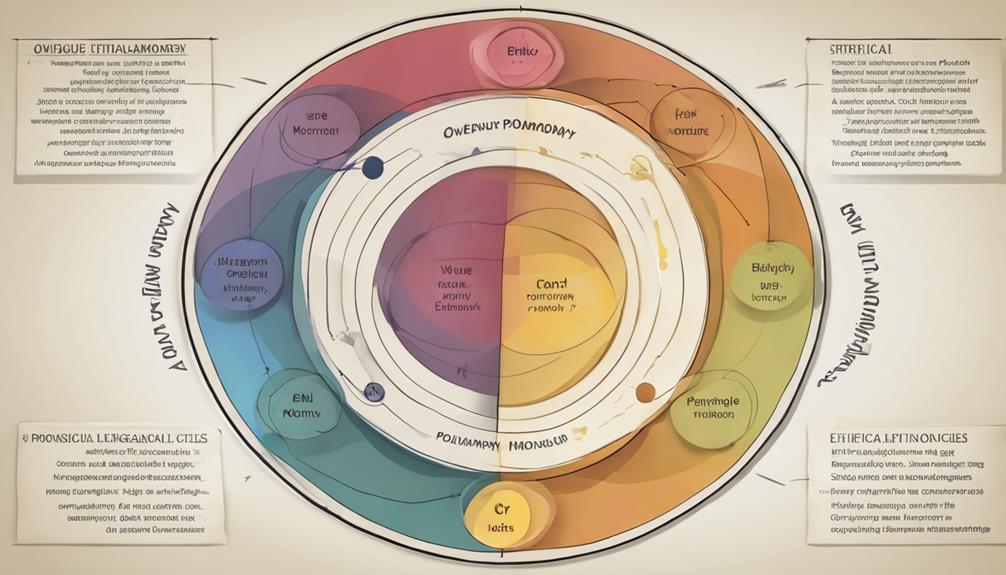Ethical non-monogamy, a topic that intrigues many inquisitive individuals, is a territory filled with inquiries and uncertainties. By using our guide, you will have the tools to navigate the complexities of multiple relationships with a clearer understanding.
From setting solid foundations to unraveling the complexities of jealousy, this chart guide serves as a beacon for those seeking a deeper understanding of unconventional love. Join us as we uncover the nuances of ethical non-monogamy, shedding light on its benefits and challenges alike.
Key Takeaways
- Ethical non-monogamy prioritizes communication, honesty, and mutual respect.
- Different types of non-monogamous relationships offer unique love exploration.
- Navigating jealousy in non-monogamy requires open communication and understanding.
- Establishing clear agreements and boundaries is crucial for successful ethical non-monogamous relationships.
Understanding Ethical Non-Monogamy
Exploring the world of ethical non-monogamy can open up new perspectives on relationships, challenging traditional norms and fostering deeper connections based on consent and communication. In ethically non-monogamous relationships, communication and honesty are the cornerstones that uphold the structure of multiple romantic or sexual connections. It's essential to engage in open dialogues, ensuring that all parties involved actively consent to the relationship dynamics. Mutual respect and understanding form the basis of these connections, where every individual's feelings are considered and valued.
Establishing clear agreements and boundaries is crucial in ethically non-monogamous relationships to navigate complexities like jealousy and insecurity. Prioritizing honesty, transparency, and caring about each partner's emotional well-being create a space where trust can flourish. Whether engaging in polyamory, open relationships, or swinging, the key remains in fostering a culture of consent and mutual understanding.
Types of Non-Monogamous Relationships

In various forms of non-monogamous relationships, individuals navigate diverse love styles and relational dynamics within established ethical boundaries. Open relationships involve consensual and ethical non-monogamous sexual relations, with tailored rules and guidelines designed to nurture trust and respect.
Polyamory expands on this concept by encompassing multiple romantic relationships with emotional commitments, including primary partners and extended family dynamics. Non-monogamous relationships such as swinging, polygyny, and polyandry offer unique ways of exploring love styles while maintaining ethical boundaries and mutual understanding among all partners involved.
Within polyamorous communities, there's a celebration of diverse gender and sexual orientations, fostering inclusivity and acceptance. Partners in open relationships often report higher satisfaction levels, increased emotional support, and opportunities for personal growth and exploration, highlighting the benefits of ethical non-monogamy in nurturing fulfilling and authentic connections.
Ethical Non-Monogamy Vs. Other Relationship Models
Moving from discussing the various types of non-monogamous relationships, we now shift our focus to comparing Ethical Non-Monogamy with other relationship models. Ethical non-monogamy, also known as consensual non-monogamy, stands out for its emphasis on consent, communication, and consideration within multiple romantic or sexual partnerships. This approach differs from traditional monogamy by promoting transparent agreements and mutual understanding among partners. When compared to other relationship structures, ethical non-monogamy, such as polyamory and open relationships, prioritizes honesty and respect for partners' feelings. These relationships involve setting unique dynamics based on individual preferences and boundaries, allowing for a more personalized and adaptable approach to love and intimacy. Studies suggest that consensual non-monogamous relationships can offer similar levels of satisfaction as monogamous relationships, highlighting the viability and potential benefits of diverse relationship structures.
| Ethical Non-Monogamy | Other Relationship Models |
|---|---|
| Prioritizes consent, communication, and consideration | May have different expectations and boundaries |
| Promotes transparent agreements and mutual understanding | Often based on traditional monogamous norms |
| Emphasizes honesty and respect for partners' feelings | May not always allow for multiple partners |
| Involves setting unique relationship dynamics | Can be less flexible in accommodating individual preferences |
Benefits and Challenges of Non-Monogamy

Research indicates that non-monogamous relationships offer both unique benefits and challenges that individuals navigate with varying degrees of success. In ethical non-monogamy, prioritizing open communication and mutual respect is key to fostering healthy and fulfilling connections. Here are some insights into the benefits and challenges of non-monogamous relationships:
- Ethical Considerations: Embracing ethical non-monogamy involves consciously navigating complex emotions and desires while upholding values of honesty, integrity, and consent. Making decisions that prioritize everyone's well-being can lead to a deeper sense of intimacy and trust among partners.
- Emotional Support: Non-monogamous relationships can provide individuals with diverse sources of emotional support and validation, expanding their network of care and understanding. This can lead to personal growth opportunities and a more robust sense of belonging within a community that values human connection.
- Human Connection: Engaging in ethical non-monogamy allows individuals to explore different facets of themselves and their relationships, fostering a deeper understanding of their needs and desires. While navigating the challenges of jealousy and communication, the emphasis on empathy and vulnerability can strengthen bonds and create space for growth.
Navigating Jealousy and Communication
Navigating jealousy and communication requires genuine openness, vulnerability, and a deep understanding of both oneself and one's partners. In the realm of ethical non-monogamy, it's essential to recognize that jealousy is a natural emotion that can arise, but it doesn't have to be a destructive force.
By fostering open communication channels, expressing feelings honestly, and engaging in self-reflection to uncover insecurities and fears, individuals can navigate jealousy in a healthy manner. Effective communication strategies, ongoing dialogue, and a willingness to address challenges head-on are vital components of managing jealousy within ethical non-monogamous relationships.
Research indicates that those in consensual non-monogamous dynamics often experience levels of commitment and satisfaction similar to monogamous partnerships when jealousy is addressed constructively. Empathy, care, and consideration for partners' well-being play significant roles in managing jealousy within ethical non-monogamous structures.
Prioritizing the understanding and resolution of personal biases, insecurities, and fears can greatly contribute to a harmonious journey through ethical non-monogamy.
Frequently Asked Questions
Is ENM the Same as Swinging?
We believe it's essential to recognize that ENM and swinging are distinct forms of consensual non-monogamy.
While swinging often revolves around recreational sex within established boundaries, ENM encompasses a broader spectrum of emotional and romantic connections with varying levels of involvement and commitment.
Both prioritize communication and consent, but ENM allows for more diverse relationship dynamics compared to the primarily sexual focus of swinging.
Understanding these differences can help navigate the complexities of non-monogamous relationships.
How Do You Navigate Ethical Non-Monogamy?
Navigating ethical non-monogamy involves establishing clear agreements on relationship dynamics, boundaries, and expectations. Communication, honesty, transparency, and empathy are vital pillars for success.
Understanding jealousy and managing it through open communication and self-awareness is key. Regularly reviewing and updating relationship agreements, boundaries, and communication strategies are crucial for maintaining healthy dynamics.
It's a journey that requires continual growth, compassion, and understanding among all involved.
How Do You Explore Nonmonogamy?
When exploring non-monogamy, we prioritize open communication, setting clear boundaries, and mutual respect. It's crucial to approach this journey with empathy, understanding, and a commitment to personal growth.
Every relationship is unique, so we navigate non-monogamy by fostering trust, practicing consent, and embracing the diversity of experiences it offers. Together, we strive to create a safe and supportive environment for all partners involved in this exploration.
What Is the Difference Between ENM and Cnm?
When it comes to the difference between ENM and CNM, it all boils down to ethics and boundaries. ENM specifically focuses on ethical practices, honesty, and mutual agreements among partners.
On the other hand, CNM is a broader term encompassing various non-monogamous relationships, whether ethical or not.
Understanding this contrast is pivotal for navigating different relationship dynamics and structures with clarity and respect.
How Can Ethical Non-Monogamy Help Overcome Jealousy in Relationships?
Understanding and practicing essential tips for ethical nonmonogamy can greatly assist in overcoming jealousy in relationships. By fostering open communication, trust, and setting clear boundaries, ethical nonmonogamy allows individuals to cultivate compersion and address insecurities, ultimately promoting healthier and more secure relationships.
Conclusion
As we journey through the intricate landscape of ethical non-monogamy, let's remember that relationships are like gardens – they require tending, nourishment, and growth.
By embracing open communication, practicing empathy, and honoring consent, we can cultivate thriving connections that defy societal norms and celebrate love in all its forms.
Let's continue to explore, learn, and grow together on this beautiful journey of ethical non-monogamy.









